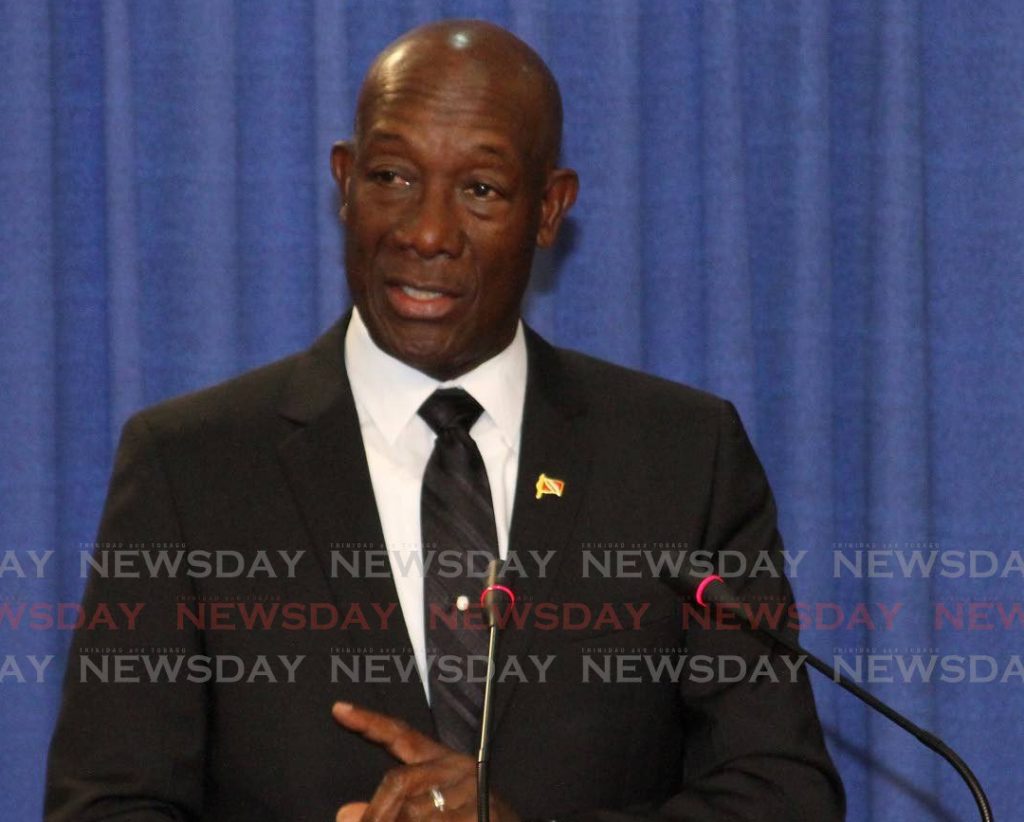Rowley addresses vaccine equity at WHO covid19 conference

THE Prime Minister, as the current chairman of Caricom, has called on the World Health Organization (WHO) to discuss the equitable distribution of covid19 vaccines, amid global claims that rich countries are hoarding the drugs, creating shortages to the detriment of poorer countries.
Speaking at the WHO's virtual press briefing on Thursday, Dr Rowley said Caricom is collectively calling on it to immediately convene a meeting to “commiserate, explain, assist and commit to a fair sharing of the available vaccine resources for the benefit of all mankind and not just the privileged few.”
WHO director general Dr Tedros Adhanom Ghebreyesus later praised TT’s handling of the pandemic, telling Rowley this country had done well during the pandemic and it was because of Rowley's leadership.
Ghebreyesus said even without vaccines, using simple public-health solutions, TT had shown the virus can be controlled and that he was pleased about TT’s first batch of vaccines being given to frontline healthcare workers.
TT began its vaccination process on Wednesday by administering the AstraZeneca vaccine to healthcare workers. Barbados gave TT 2,000 doses of the vaccine from a batch of 100,000 it received from the Government of India.
Independent Caricom states also called for equitable distribution of vaccines on Wednesday in a resolution adopted by the Permanent Council of the Organization of American States (OAS), a Caribbean News Agency (CANA) article said on Thursday.
The resolution called for a “scaling-up of production by the main vaccine-producing countries, faster distribution of the vaccines, and low-cost financing from international financial institutions so that developing countries can buy needed stocks,” the report said.
At the WHO press conference, Rowley said he was pleased to be part of the public conversation about the world’s ongoing challenge in responding to the virus, which for more than a year has ravaged the Caribbean region’s economies and was “also killing us indiscriminately across the world.”
He said when the full nature of the virus was realised, there was initial uncertainty about how long it would last, but the world hoped that collective scientific know-how would lead to a vaccine in the shortest possible time and prayed for its efficacy. The world was now in a place where there are tested and proven vaccines, he said.
“A brightening light is shining on our way to a more successful response to the still-marauding virus.”
He said even as the world breathes a collective sigh of relief, the logistical difficulties associated with instantly satisfying the needs of all people were acknowledged. But there were models of caring and sharing which would allow everyone to be beneficiaries of fair and equitable access as WHO goes on to certify more vaccines.
Rowley said the region’s history was “littered with instances of destructive behaviour, disrespectful dominance, imbalances and other forms of man’s inhumanity to man.
“But on this rare occasion, when we are all yoked to an invisible destroyer, it is my hope and plea that, when the journal of this experience is written, it would deviate from what is mostly the norm and record that on this occasion, the rich took care of the poor, and the small and the impecunious were not trampled with disdain by those who could have done so simply because they had the wherewithal to do it.”
Rowley reminded that the systems of fairness, caring and sharing were needed to work according to plan so that all could come out of “this dreadful experience” guided by the principles of equity and compassion.
He said as there is the understandable rush to receive the vaccines and inoculation of the various populations, the region and small-island states were more than a little concerned that there is or is to be hoarding and price-gouging as well as undue preference in some quarters.
He said the organisation’s work was far from over, and more than ever it was required to protect the world from “the many offshoots of the viral era and encourage the science, not only to further understanding the biology, physiology and management of the virus but the defeat of its power through equitable distribution of its nemesis: the vaccine.”
Rowley said small states such as those of the Caribbean made and continued to make high sacrifices in order to protect their populations from the virus’s worst ravages. He said the region anxiously anticipated the promised relief and general benefits that a successful, early vaccination can bring to all.
“All we ask, as a member of the family of nations, is that we not be forgotten, ignored or, worse, taken advantage of in this business of life and death.”
He said Caricom acknowledged the good work and dedication of the organisation’s director-general and looked forward to welcoming him to the healthy Caribbean in the very near future.


Comments
"Rowley addresses vaccine equity at WHO covid19 conference"